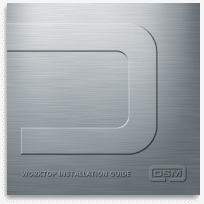Choosing the right worktop might seem straightforward at first, but when it comes to stainless steel, the line between domestic and commercial use isn’t as clear-cut as you’d expect. While both offer durability, hygiene, and sleek aesthetics, they’re engineered with different environments in mind. So, what exactly sets a commercial stainless steel worktop apart from its domestic counterpart?
Let's dive right into it and find out what the differences are, why they're different, and the purpose behind it.
What Are Stainless Steel Worktops?
When you come to DSM to discuss your project and provide a quote for stainless steel countertops, you can ask as many questions as you like to make sure you're getting the right worktops for your needs.
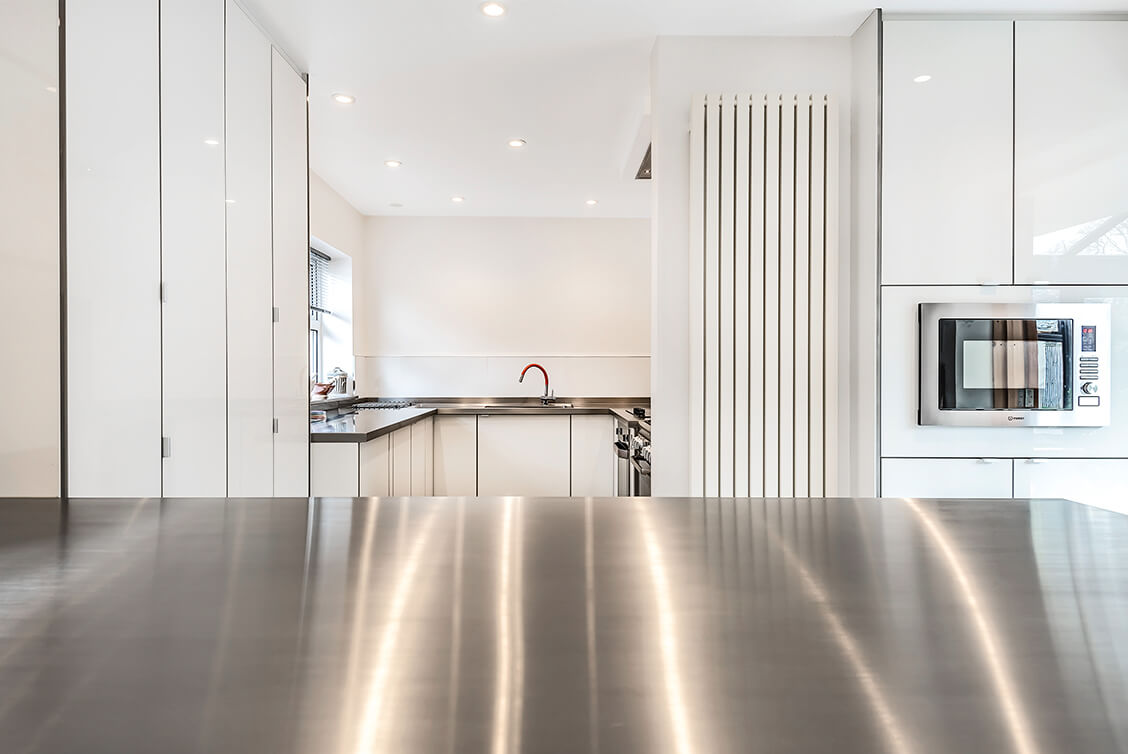
Stainless steel worktops are surfaces fabricated from high-grade steel, they’re usually made of 304 or 316 grade stainless steel. These grades are known for their resistance to corrosion, bacteria, heat and impact. They’re popular in domestic kitchens, professional catering environments, laboratories, and even workshops for their hygienic and hard-wearing nature.
DSM Stainless Products specialises in fully bespoke worktops, offering clients precision-crafted surfaces tailored to specific applications from home renovations to demanding commercial fit-outs.
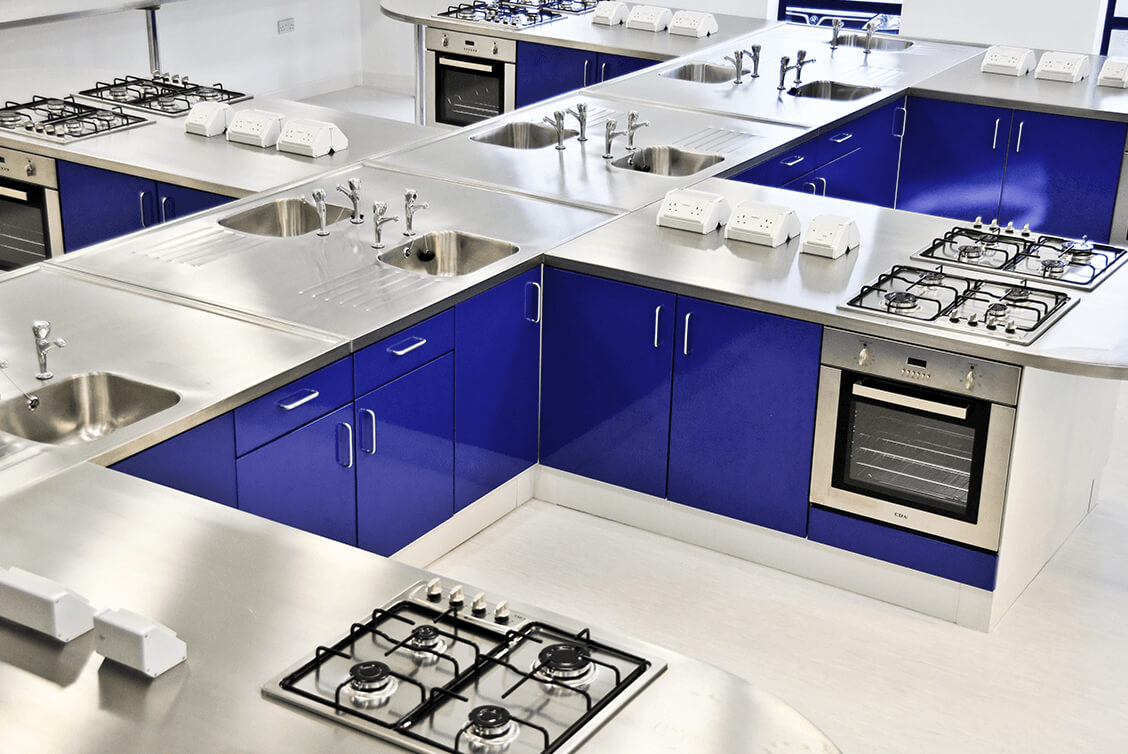
Durability and Material Grade
One of the most obvious distinctions lies in material composition and thickness. Commercial stainless steel worktops are typically made from heavier gauge steel, often in the range of 1.5mm to 3mm thick, offering increased resilience under constant, heavy use.
In commercial settings like restaurant kitchens or pharmaceutical labs, worktops may also be fabricated from 316-grade stainless steel, which offers additional resistance to chemicals and salt exposure.
By contrast, domestic stainless steel worktops usually rely on 304-grade stainless a food-safe, durable material that balances performance with aesthetic flexibility, suitable for everything from home kitchens to utility rooms.
Design and Aesthetic Considerations
Domestic worktops tend to place more emphasis on visual appeal, with a wide array of custom design options. At DSM, clients can choose from a variety of:
- Edge profiles (square, bullnose, waterfall, and more)
- Surface finishes (brushed satin, matte, or polished)
- Integrated features like welded sinks or splashbacks
In contrast, commercial designs prioritise function over form, favouring flat, uninterrupted surfaces and easy-clean detailing. Rounded corners, upstands, and anti-drip edges are often standard, ensuring compliance with hygiene regulations and ease of maintenance.
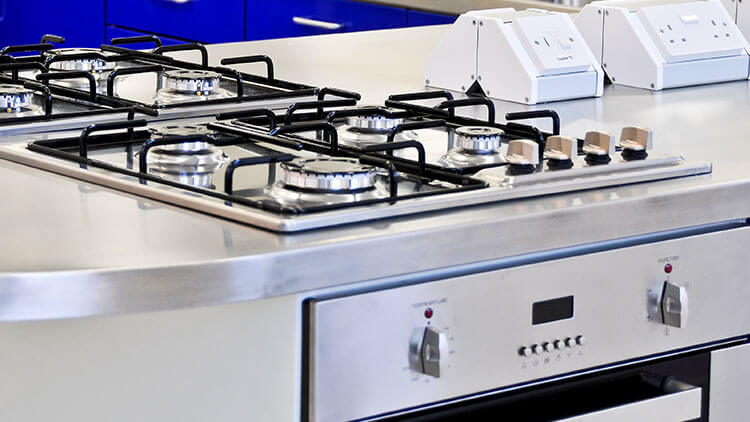

Customisation and Layout
In domestic installations, there’s often more room for creativity. Clients might incorporate:
- Integrated draining boards
- Cutouts for hobs or taps
- Seamless joins between splashbacks and work surfaces
Commercial layouts are more utilitarian. You’re more likely to find modular designs, standardised sizes and easily removable sections for cleaning or replacement, all geared towards efficiency and uptime.
Hygiene and Compliance Standards
Both domestic and commercial worktops offer hygienic, non-porous surfaces, but only commercial ones are required to comply with specific regulatory standards.
Whether in a commercial kitchen, hospital cleanroom, or school food tech lab, stainless worktops must meet certain hygiene criteria, including radius corners and integrated coved upstands to reduce microbial traps.
Domestic worktops aren’t bound by the same rules but can benefit from the same principles. Many homeowners choose stainless specifically because it’s antibacterial and easy to clean, perfect for busy family life.

Cost Comparison
Generally speaking, commercial stainless steel worktops are more expensive due to thicker steel, reinforced frameworks, and regulatory compliance. Installation costs can also rise if custom fitting is required in complex layouts.
Domestic options, while often cheaper, may still carry a premium depending on the level of customisation. High-end finishes, bespoke edges, and fully integrated sinks will all increase the price, though you’re getting a unique piece designed to last decades.
DSM offers competitive pricing across both ranges, and quotes are always tailored to the project’s specific demands.
Which One Is Right for You?
This really comes down to how the worktop will be used.
If you’re kitting out a professional catering kitchen, lab, or food prep area where hygiene and durability are paramount, a commercial-grade solution is non-negotiable. But if you’re renovating your home and want a stylish, functional surface that’ll hold up to daily wear and tear, a domestic stainless steel worktop is more than sufficient and usually more aesthetically pleasing.
Still unsure? DSM offers a free consultation service to help determine the right grade, finish and layout for your space.
Real-World Applications
DSM has delivered worktops to all kinds of environments:
- A bespoke 316-grade commercial lab bench for a UK pharmaceutical facility, with integrated sink and reagent shelf
- Custom-fitted 304 stainless kitchen counters in a modern domestic extension in Surrey, with rounded corners and brushed finish
- Commercial prep counters for an independent bakery chain, complete with anti-drip lips and splashbacks
Whatever your setting, we’ve likely seen and solved something similar.
Final Thoughts
While both commercial and domestic stainless steel worktops share the same foundation strength, hygiene, and sleek aesthetics, the differences lie in grade, thickness, design intent and compliance. Choosing the right one depends entirely on how and where you plan to use it.
Whether you’re planning a kitchen revamp or fitting out a high-volume workspace, DSM Stainless Products will guide you through the process from first idea to final install.
FAQs
Can I use a commercial worktop in my home kitchen?
Absolutely. It may look more utilitarian, but it will be incredibly robust ideal for serious cooks or low-maintenance interiors.
Are domestic stainless steel worktops durable enough for high use?
Yes, especially when made from 304-grade steel. They handle heat, stains, and knocks far better than wood or laminate.
Is 316 stainless worth it for residential use?
Unless you’re near the coast or dealing with acidic substances, 304-grade is more than adequate and easier on the wallet.
Stainless steel has natural anti-bacterial qualities that resist the growth of bacteria and germs much more than other worktop materials, so even cleaning with anti-bacterial solutions is often unnecessary.
For more information on cleaning stainless steel, see our Stainless Steel Product Care Brochure
If you're interested in a new kitchen worktop, take a look at our kitchen worktops page for more information.
You can give us a call on 01159 255927 whenever you'd like to ask questions, get advice and even ask for a free, no-obligation quote!
Our Guides & Brochures
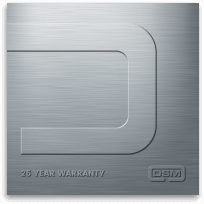
DSM Stainless Steel Product Care
Please take a moment to read our product care brochure to help you look after you new stainless steel units to ensure they look as good as the day they are installed.
Download
DSM 25 Year Warranty
For more information on our 25 year warranty please download our brochure
Download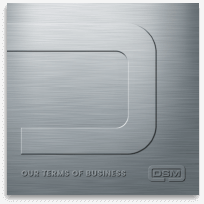
DSM Terms of Business
Our Terms of Business Agreement sets out the terms and conditions on which we agree to provide services for you
Download